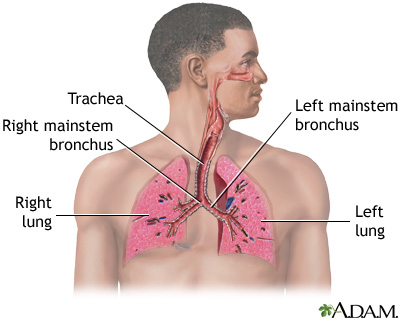Health Library
Hospital-acquired pneumonia
Nosocomial pneumonia; Ventilator-associated pneumonia; Health-care associated pneumonia; HCAP
Hospital-acquired pneumonia is an infection of the lungs that occurs during a hospital stay. This type of pneumonia can be very severe. Sometimes, it can be fatal.
Images


I Would Like to Learn About:
Causes
Pneumonia is a common illness. It is caused by many different germs. Pneumonia that starts in the hospital tends to be more serious than other lung infections because:
- People in the hospital are often very sick and cannot fight off germs.
- The types of germs present in a hospital are often more dangerous and more resistant to treatment than those outside in the community.
Pneumonia occurs more often in people who are using a ventilator, which is a machine that helps them breathe.
Hospital-acquired pneumonia can also be spread by health care workers, who can pass germs from their hands, clothes, or instruments from one person to another. This is why hand-washing, wearing gowns, and using other safety measures is so important in the hospital.
People can be more likely to get pneumonia while in the hospital if they:
- Abuse alcohol
- Have had chest surgery or other major surgery
- Have a weak immune system from cancer treatment, certain medicines, or severe wounds
- Have long-term (chronic) lung disease
- Breathe saliva or food into their lungs as a result of not being fully alert or having swallowing problems (for example, after a stroke)
- Are not mentally alert due to medicines or illness
- Are older
- Are on a breathing machine (ventilator)
Symptoms
In older adults, the first sign of hospital-acquired pneumonia may be mental changes or confusion.
Other symptoms may include:
- A cough with greenish or pus-like phlegm (sputum)
- Fever and chills
- General discomfort, uneasiness, or ill feeling (malaise)
- Loss of appetite
- Nausea and vomiting
- Sharp chest pain that gets worse with deep breathing or coughing
- Shortness of breath
- Decreased blood pressure and fast heart rate
Exams and Tests
If the health care provider suspects pneumonia, tests will be ordered. These may include:
- Arterial blood gases, to measure oxygen levels in the blood
- Blood cultures, to see if the infection has spread to the blood
- Chest x-ray or CT scan, to check the lungs
- Complete blood count (CBC)
- Pulse oximetry, to measure oxygen levels in the blood
- Sputum culture or sputum Gram stain, to check what germs are causing the pneumonia
- Bronchoscopy, to get cultures directly from the lungs in some cases
Treatment
Treatments may include:
- Antibiotics through your veins (IV) to treat the lung infection. The antibiotic you are given will fight the germs that are found in your sputum culture or are suspected to be causing the infection.
- Oxygen to help you breathe better and lung treatments to loosen and remove thick mucus from your lungs.
- Ventilator (breathing machine) using a tube or a mask to support your breathing.
Outlook (Prognosis)
People who have other serious illnesses do not recover as well from pneumonia as people who are not as sick.
Hospital-acquired pneumonia can be a life-threatening illness. Long-term lung damage may occur.
Prevention
People visiting someone in the hospital need to take steps to prevent spreading germs. The best way to stop the spread of germs is to wash your hands often. Stay home if you are sick. Keep your immunizations up to date.
After any surgery, you will be asked to take deep breaths and move around as soon as possible to help keep your lungs open. Follow the advice of your provider to help prevent pneumonia.
Most hospitals have programs to prevent hospital-acquired infections.
Related Information
Community-acquired pneumonia in adultsAlcohol use disorder
Immunodeficiency disorders
Aspiration
Pneumonia in adults - discharge
References
Chastre J, Luyt CE. Ventilator-associated pneumonia. In: Broaddus VC, Ernst JD, King TE, et al, eds. Murray and Nadel's Textbook of Respiratory Medicine. 7th ed. Philadelphia, PA: Elsevier; 2022:chap 49.
Kalil AC, Metersky ML, Klompas M, et al. Management of adults with hospital-acquired and ventilator-associated pneumonia: 2016 clinical practice guidelines by the Infectious Diseases Society of America and the American Thoracic Society. Clin Infect Dis. 2016;63(5):e61-e111. PMID: 27418577 pubmed.ncbi.nlm.nih.gov/27418577/.
Klompas M. Nosocomial pneumonia. In: Bennett JE, Dolin R, Blaser MJ, eds. Mandell, Douglas, and Bennett's Principles and Practice of Infectious Diseases. 9th ed. Philadelphia, PA: Elsevier; 2020:chap 301.
Metersky ML, Kalil AC. Hospital-acquired pneumonia. In: Broaddus VC, Ernst JD, King TE, et al, eds. Murray and Nadel's Textbook of Respiratory Medicine. 7th ed. Philadelphia, PA: Elsevier; 2022:chap 48.
BACK TO TOPReview Date: 8/1/2021
Reviewed By: Denis Hadjiliadis, MD, MHS, Paul F. Harron, Jr. Associate Professor of Medicine, Pulmonary, Allergy, and Critical Care, Perelman School of Medicine, University of Pennsylvania, Philadelphia, PA. Also reviewed by David Zieve, MD, MHA, Medical Director, Brenda Conaway, Editorial Director, and the A.D.A.M. Editorial team.
 | A.D.A.M., Inc. is accredited by URAC, for Health Content Provider (www.urac.org). URAC's accreditation program is an independent audit to verify that A.D.A.M. follows rigorous standards of quality and accountability. A.D.A.M. is among the first to achieve this important distinction for online health information and services. Learn more about A.D.A.M.'s editorial policy, editorial process and privacy policy. A.D.A.M. is also a founding member of Hi-Ethics. This site complies with the HONcode standard for trustworthy health information: verify here. |
The information provided herein should not be used during any medical emergency or for the diagnosis or treatment of any medical condition. A licensed medical professional should be consulted for diagnosis and treatment of any and all medical conditions. Links to other sites are provided for information only -- they do not constitute endorsements of those other sites. © 1997- 2022 A.D.A.M., a business unit of Ebix, Inc. Any duplication or distribution of the information contained herein is strictly prohibited.
